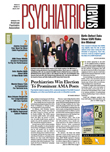Why should psychiatrists be concerned about high blood pressure or its treatment in their patients?
After all, high blood pressure doesn't usually produce psychiatric symptoms, and mental illness doesn't usually raise blood pressure.
“Well, for a start, psychiatrists can't avoid it,” said Michael Ziegler, M.D., a professor of medicine at the University of California, San Diego. “Hypertension is the most common reason why patients visit the doctor, and its prevalence increases with age and obesity. By age 65, half of your patients will have high blood pressure.”
Ziegler spoke at an “Advances in Medicine” session at APA's annual meeting in San Diego in May. If the number of interruptions for questions from the audience was any indication, the psychiatrists were indeed concerned.
In fact they may be faced with the condition as a side effect of treatment, since atypical antipsychotics often contribute to weight gain and diabetes, both risk factors for hypertension.
“The U.S. and Canada are doing a better job about high blood pressure awareness than Europe is, but rates of control are still not good,” said Ziegler. About 70 percent of Americans with high blood pressure are aware that they have the condition, but only 34 percent meet goals for controlling it.
The underlying causes for what is still called “essential hypertension” are poorly understood, but obesity, lack of exercise, dietary fat and sodium, sleep apnea, heavy alcohol use, hyperaldosteronism, and neuroleptic use can be contributing factors.
Sleep apnea affects 10 percent to 50 percent of hypertensive individuals, depending on the diagnostic criteria used, said Ziegler. Nighttime sleep-apnea episodes induce hypertension by causing a burst of activity in the sympathetic nervous system, as often as once a minute, producing a stress response and hormone release that persists during the day. Often patients will present with daytime drowsiness and a consequent loss of attention.
Some psychiatric drugs can affect blood pressure, Ziegler told Psychiatric News in a later interview. Doctors have long known that monoamine oxidase inhibitors lower blood pressure on their own, but when a patient also eats foods containing tyramine, they can sharply elevate blood pressure. Some tricyclic antidepressants or norepinephrine blockers may cause postural hypotension.
Although SSRIs seem to have little effect on blood pressure, one norepinephrine/serotonin reuptake inhibitor, venlaflaxine, can raise blood pressure 4-5 mm Hg and should be avoided in patients with hypertension, said Ziegler.
“However, the world is made up of individuals, not averages,” he said. “If venlaflaxine is indicated, I suggest monitoring blood pressure to see if clinically significant changes occur.”
Some antihypertensive drugs can produce psychiatric symptoms, as well. Much research on the biology of depression in the 1950s was stimulated when the early antihypertensive reserpine caused depressive symptoms in some patients. Although reserpine is no longer used to control blood pressure, guanfacine and other clonidine-type drugs are occasionally still prescribed. They can cause drowsiness and general mental slowing that patients may attribute to depression, but which are not confirmed by the Hamilton Depression Scale or other measures, said Ziegler.
Diuretics, the most commonly used antihypertensives, may cause impotence or lack of energy in high doses, effects that may result in referrals to a psychiatrist. Beta blockers are not only tools for cardiologists but have been used by psychiatrists to lessen anxiety in musicians and public speakers. However, some side effects of these drugs, such as lack of energy and vivid nightmares, may bring patients to a psychiatrist's office.
Newer categories of antihypertensives, like angiotensin-converting enzyme inhibitors (ACEIs) or angiotensin receptor blockers appear to produce few, if any, psychiatric symptoms.
Many of the side effects of antihypertensive drugs arise from dosing levels that are higher than necessary, said Ziegler.
“Package inserts, the Physician's Desk Reference, pharmaceutical company literature, and most textbooks are all over the board and do not agree with expert opinion as laid out in the Seventh Report of the Joint National Committee on Prevention, Detection, Evaluation, and Treatment of High Blood Pressure [JNC 7],” he told listeners.
In general, the JNC 7 recommends starting dosages 50 percent lower than those other sources do, he said. For instance, the standard dose for thiazide diuretics is 25 mg, but starting a patient at 12.5 mg lowers blood pressure almost as much with less chance of adverse effects. Increasing doses ratchets up side effects but does not increase the antihypertensive effect proportionately.
“There is no superdrug for high blood pressure,” said Ziegler.“ The best way to treat it is by adding low doses of different drugs—the effect is additive.”
The mainstays of ant ihypertensive treatment recommended by JNC 7 are the thiazide diuretics and ACEIs, both of which are available in off-patent versions alone or in combination. “With combined medications, one pill a day can control 90 percent of hypertensives,” said Ziegler.
Lifestyle changes—losing weight, exercising, eating less salt and more fish with omega-3 fatty acids, and reducing alcohol consumption—can help and should be suggested, but are hard to sustain, he said.
Because hypertension is a condition without obvious symptoms, keeping patients on their medications is never easy, he said. The best way to treat high blood pressure is by developing and maintaining rapport with patients, an injunction not unfamiliar to psychiatrists.
“Let the patient know you care,” said Ziegler. “Bring them back frequently and say positive things. Emphasizing adverse outcomes makes compliance worse.”
He monitors medication compliance “excessively,” he said, and has a pharmacy student check pill counts, too. He also asks patients to bring in their medications to the second office visit, “just to make sure you got the right medicine,” he tells them. In reality, he wants to see if they've even filled the prescription. “When they bring them in, you know they have them.”
A reference card on diagnosing and treating hypertension based on the Seventh Report of the Joint National Committee on Prevention, Detection, Evaluation, and Treatment of High Blood Pressure (JNC 7) is posted at<www.nhlbi.nih.gov/guidelines/hypertension/jnc7card.htm>.▪

